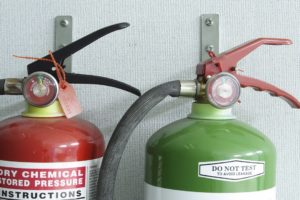
You must know that one of the most critical parts of residential fire safety is having a functional fire extinguisher or two around your home.
It’s cold in Maryland; as cold as it is, there is no more vital time to be aware of fire safety than winter. In fact, more house fires occur due to heavy usage of heating equipment. By now, you must know that one of the most critical parts of residential fire safety is having a functional fire extinguisher or two around your home. But you may be wondering: will your fire extinguisher freeze?
Why Freezing is Problematic
Let’s cut to the chase: some fire extinguishers will freeze in temperatures below 40 Fahrenheit. This will make your extinguisher permanently unusable. So, if your pressurized water fire extinguisher is exposed to temperatures below that threshold, it’s ideal to be cautious and purchase a new one.
However, this usually poses little of a problem for many homeowners. Most people keep their homes above 40 degrees even during cold winters. But here are several scenarios where it may become problematic:
- You place a fire extinguisher in a poorly insulated area, such as a garage or shed
- Your home doesn’t have central heating
- You are a commercial business owner who doesn’t heat the site at night
There are multiple things that could be more tragic during a fire than discovering your fire extinguisher will not work because it froze somewhere along the line.
Solutions to Freezing Fire Extinguishers
The most apparent solution to freezing fire extinguishers is to place them somewhere freezing, which won’t be an issue. An excellent simple method is to move the device away from a poorly insulated window and into a cupboard. If you keep a fire extinguisher in your garage, consider placing it on the other side of the door leading inside your house. This would enjoy the benefit of more insulation.
If removing the threat of cold isn’t an option, remember that not all fire extinguishers freeze. So, look into fire extinguishers that utilize dry chemicals instead of mist or pressurized water. Remember that pressurized water must only be used on Class A fires. In addition, dry chemical fire extinguishers may endure freezing temperatures with no problem. If you have confirmed that your extinguisher is not pressurized water or mist, then you may put the threat of freezing out of your mind.
Commercial and Residential Fire Prevention from Judd Fire Protection
If you want to ensure your home and business are safe throughout the year, trust Judd Fire Protection, LLC. We have over two decades of experience designing, installing, inspecting, and repairing residential and commercial fire protection systems. We serve clients throughout Maryland, Pennsylvania, Washington, D.C., Virginia, and West Virginia. If you are interested in finding out more about our services and protecting your home and business, give us a call at 410-871-3480.
